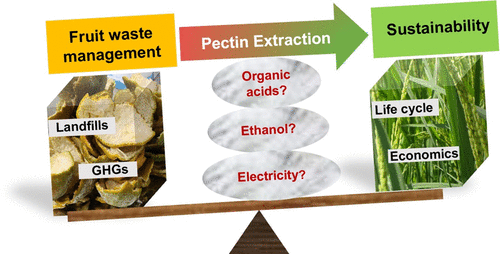当前位置:
X-MOL 学术
›
ACS Eng. Au
›
论文详情
Our official English website, www.x-mol.net, welcomes your
feedback! (Note: you will need to create a separate account there.)
Sustainability Challenges and Opportunities in Pectin Extraction from Fruit Waste
ACS Engineering Au ( IF 4.3 ) Pub Date : 2022-01-10 , DOI: 10.1021/acsengineeringau.1c00025 Cresha Gracy Nadar 1, 2 , Amit Arora 2 , Yogendra Shastri 3
ACS Engineering Au ( IF 4.3 ) Pub Date : 2022-01-10 , DOI: 10.1021/acsengineeringau.1c00025 Cresha Gracy Nadar 1, 2 , Amit Arora 2 , Yogendra Shastri 3
Affiliation

|
Pectin is a plant-based hydrocolloid that has unique structural and biochemical properties. It is extracted from discarded fruit-processing industry waste, such as peels. Due to its natural origin and novel properties, pectin is widely accepted in various sectors such as food, pharmaceuticals, nutraceuticals, cosmetics, biomedical, and edible packaging. This work aims to understand the conventional pectin production process from the sustainability standpoint using the life cycle assessment methodology. This enables novel insights into the process, which promotes a greener and more sustainable process of pectin production. In this work, the total life cycle impact in producing 1 kg of pectin was 9.69 kg CO2 equiv in the base-case scenario. In the pectin production process, the stages that contribute to higher impacts were also identified. Furthermore, mineral and organic acids were compared to understand the greenness of acids from the sustainability view. Citric acid, ethanol, and electricity appeared to be the major contributors to climate change impacts; therefore, scenario studies were included to address these issues. The analysis is used as a basis for a discussion about sustainable pectin extraction and its scale-up. Overall, we believe that this perspective would aid in the decision-making process for choosing green and sustainable methods to make the pectin production process environment safe and industrially more acceptable.
中文翻译:

从水果废料中提取果胶的可持续性挑战和机遇
果胶是一种植物性水胶体,具有独特的结构和生化特性。它是从废弃的水果加工业废料中提取的,例如果皮。由于其天然来源和新颖的特性,果胶在食品、药品、保健品、化妆品、生物医学和可食用包装等各个领域得到广泛接受。这项工作旨在使用生命周期评估方法从可持续性的角度了解传统的果胶生产过程。这使得对该过程有了新的认识,从而促进了果胶生产的更绿色和更可持续的过程。在这项工作中,生产 1 kg 果胶的总生命周期影响为 9.69 kg CO 2在基本情况下等效。在果胶生产过程中,还确定了导致更高影响的阶段。此外,还比较了无机酸和有机酸,以从可持续性角度了解酸的绿色性。柠檬酸、乙醇和电力似乎是造成气候变化影响的主要因素;因此,包括情景研究来解决这些问题。该分析被用作讨论可持续果胶提取及其扩大规模的基础。总体而言,我们认为这一观点将有助于选择绿色和可持续方法的决策过程,以使果胶生产过程环境安全且在工业上更容易接受。
更新日期:2022-01-10
中文翻译:

从水果废料中提取果胶的可持续性挑战和机遇
果胶是一种植物性水胶体,具有独特的结构和生化特性。它是从废弃的水果加工业废料中提取的,例如果皮。由于其天然来源和新颖的特性,果胶在食品、药品、保健品、化妆品、生物医学和可食用包装等各个领域得到广泛接受。这项工作旨在使用生命周期评估方法从可持续性的角度了解传统的果胶生产过程。这使得对该过程有了新的认识,从而促进了果胶生产的更绿色和更可持续的过程。在这项工作中,生产 1 kg 果胶的总生命周期影响为 9.69 kg CO 2在基本情况下等效。在果胶生产过程中,还确定了导致更高影响的阶段。此外,还比较了无机酸和有机酸,以从可持续性角度了解酸的绿色性。柠檬酸、乙醇和电力似乎是造成气候变化影响的主要因素;因此,包括情景研究来解决这些问题。该分析被用作讨论可持续果胶提取及其扩大规模的基础。总体而言,我们认为这一观点将有助于选择绿色和可持续方法的决策过程,以使果胶生产过程环境安全且在工业上更容易接受。











































 京公网安备 11010802027423号
京公网安备 11010802027423号